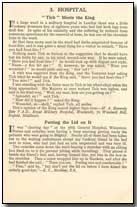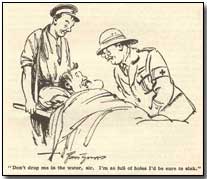Memoirs & Diaries - The Best 500 Cockney War Stories - "Tich" Meets the King and Other Stories
 Published in London
in 1921, The Best 500 Cockney War Stories
comprised, in the words of its newspaper publisher (The London Evening
News) "a remembering and retelling of those war days when laughter
sometimes saved men's reason".
Published in London
in 1921, The Best 500 Cockney War Stories
comprised, in the words of its newspaper publisher (The London Evening
News) "a remembering and retelling of those war days when laughter
sometimes saved men's reason".
The collection of short memoirs, some 500 in total, is divided into five categories - Action, Lull, Hospital, High Seas and Here and There. This page contains five stories from Hospital, led by "Tich" Meets the King.
Other sections within the collection can be accessed using the sidebar to the right.
"Tich" Meets the King
In a large ward in a military hospital in London there was a little Cockney drummer boy of eighteen years who had lost both legs from shell fire.
In spite of his calamity and the suffering he endured from numerous operations for the removal of bone, he was one of the cheeriest boys in the ward.
At that time many men in the ward had limbs amputated because of frost-bite, and it was quite a usual thing for a visitor to remark, "Have you had frost-bite?"
Nothing made Tich so furious as the suggestion that he should have lost his limbs by any, to his mind, second-rate way. If he were asked, "Have you had frost-bite?" he would look up with disgust and reply, "Naow—a flea bit me!"
If, however, he was asked, "Were you wounded?" he would smile and say, "Not 'arf!"
A visit was expected from the King, and the Tommies kept asking Tich what he would say if the King said, "Have you had frost-bite?"
"You wite" said Tich.
I was standing with the Sister near to Tich in his wheel-chair when the King approached. His Majesty at once noticed Tich was legless, and said in his kind way, "Well, my man, how are you getting on?"
"Splendid, sir!" said Tich.
"How did it happen?" asked the King.
"Wounded, sir - shell," replied Tich, all smiles.
Tich's opinion of the King soared higher than ever.
M. A. Kennedy (late V.A.D., Royal Military Hospital, Woolwich), 70 Windmill Hill, Enfield, Middlesex
Putting the Lid on It
It was "clearing day" at the 56th General Hospital, Wimereux.
Nurses and orderlies were having a busy morning getting ready the patients who were going to Blighty. Nearly all of them had been taken out to the waiting ambulances except my Cockney friend in the bed next to mine, who had just had an arm amputated and was very ill.
Two orderlies came down the ward bearing a stretcher with an oblong box fixed on to it (to prevent jolting while travelling). They placed it beside my friend's bed, and, having dressed him, put him in the box on the stretcher.
Then a nurse wrapped him up in blankets, and after she had finished she said: "There you are. Feeling nice and comfortable?"
"Fine," said he, "but don't put the lid on before I have kissed the orderly good-bye."
E. C., Hackney, E.8
Riddled in the Sands
One of the finest exhibitions of Cockney spirit I saw during the war occurred in Mesopotamia after the Battle of Shaiba (April 1915), in which we had completely routed the Turkish army.
We were busy evacuating the wounded in boats across the six-mile stretch of water which separated us from Basra. A sergeant who had been hit by no fewer than six machine-gun bullets was brought down in a stretcher to be put in one of the boats.
As I superintended this manoeuvre he said to me: "Don't drop me in the water, sir. I'm so full of holes I'd be sure to sink!"
F. C. Fraser (Lieut.-Col., Ind. Med. Service), 309 Brownhill Road, Catford, S.E.6
Season!
A cockney soldier, badly hit for the third time, was about to be carried once more on board the ambulance train at Folkestone.
When the bearers came to his stretcher, one said to the other, "What's it say on his ticket?"
"Season!" said a voice from the stretcher.
Rev. A. T. Greenwood, Wallington, Surrey
Where's the Milk and Honey?
A medical Officer of a London division in Palestine was explaining to a dying Cockney in his field ambulance at Bethlehem how sorry he was that he had no special comforts to ease his last moments, when the man, with a cheery grin, remarked: "Oh, that's all right, sir. Yer reads as 'ow this 'ere 'Oly Land is flowing with milk and 'oney; but I ain't seen any 'oney myself, and in our battery there's 15 men to a tin o' milk."
E. T. Middleton, 32 Denmark Road, West Ealing, W.13
Next - "Lunnon" and four other stories
3 British Officers were executed by courts martial during the war, as opposed to 316 Private soldiers and 24 Non-Commissioned Officers. The vast majority were for desertions.
- Did you know?

